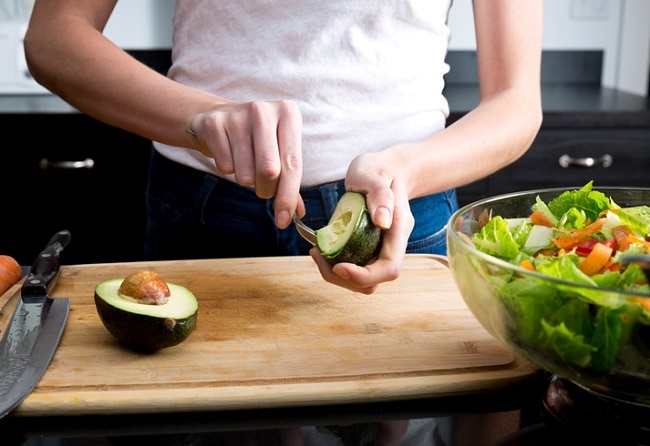You know how difficult it is to stay healthy and fit during the holiday season. It’s so challenging, in fact, that one of two scenarios will likely unfold: 1) You do everything in your power to defy tasty temptations in an effort to not gain weight or 2) You decide to wait for the New Year before putting your health goals front and center. Neither of these is ideal, which is why you need to adjust your perspective. There’s a smart way to avoid packing on pounds without depriving yourself of the joyous holiday festivities. Eat. More. Fat.
The Benefits of Eating More Fat
Yes, you read that correctly!
By shifting the macronutrient profile of your diet to be heavier in fats, you’ll be able to eat the same amount of calories – or perhaps slightly less. When your body uses fat as its primary fuel source, you feel satiated, have a better balance of energy and may experience improved sleep and mental focus. (Volek, 2011)
Your (Fat-Filled) Holiday Plan:
1.Act now!
Start incorporating more healthy fats into your diet as soon as possible. By starting before the holiday rush, you allow yourself time to diminish sugar cravings (and the inevitable energy dips that come with them). So when the sweet treats roll in, your defenses are already up. Imagine how easy it would be to avoid cookies, cakes and pies if you didn’t actually want them in the first place!
2. Say yes to saturated
So which fats are the best? All of them! Well, almost. More specifically, all the fats that are natural, including saturated fats.
Properly sourced animal fats – such as grass-fed tallow, rendered duck fat, lard from pasture-raised pigs and coconut oil – received a bad rap for years. Fortunately, studies are now showing they play a critical role in a balanced nutrition plan. (Patty W, 2016)
This is certainly not to say that every meal should be fried in lard; rather, just be sure to include saturated fats in your well-balanced diet.
3. Up the unsaturated, too
You need a full-spectrum of fats, including mono-unsaturated and polyunsaturated fats. You can get these from avocado, olive oil, omega-3-rich wild salmon, grass-fed meats as well as some raw nuts and seeds in moderation. Note: be careful if you’re following an auto-immune protocol. (Wahls, 2015)
4. Give a boot to the bad
Heard of trans fats? These come from hydrogenated oils, which are essentially healthy vegetable oils that have been chemically altered to help give foods a longer shelf life. That’s great for food manufacturers, but not so great for your health. Trans fats have proven harmful by promoting inflammation and affecting healthy cholesterol levels. Avoid these types of fats at all cost! (McNight, 2016)
Essentially, it’s about making some small changes. Maybe you’ll add more avocado to your morning omelet instead of toast or fruit on the side. Perhaps you’ll pour extra olive oil on your salad or choose dark meat and oily fish instead of their leaner counterparts. Stay open minded and follow these steps to turn your body into a fat-burning machine. You’ll enjoy the holidays much more knowing your body is well nourished while your taste buds enjoy delicious – even decadent – meals.
(1)Volek, Jeff, Stephen D. Phinney, Eric Kossoff, Jacqueline A. Eberstein, and Jimmy Moore. The Art and Science of Low Carbohydrate Living: An Expert Guide to Making the Life-saving Benefits of Carbohydrate Restriction Sustainable and Enjoyable. Lexington, KY: Beyond Obesity, 2011. Print
(2) Siri-Tarino, Patty W., Qi Sun, and And Frank B Hu. “Patty W Siri-Tarino.” Meta-analysis of Prospective Cohort Studies Evaluating the Association of Saturated Fat with Cardiovascular Disease. American Journal of Clinical Nutrition, n.d. Web. 12 Nov. 2016
(3) Wahls, Terry L., and Eve Adamson. The Wahls Protocol: A Radical New Way to Treat All Chronic Autoimmune Conditions Using Paleo Principles. New York: Avery, 2015. Print.
(4) “Why Is Hydrogenated Oil Bad for You?” LIVESTRONG.COM. LIVESTRONG.COM, 18 Dec. 2013. Web. 12 Nov. 2016

